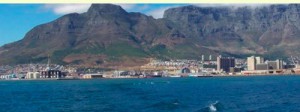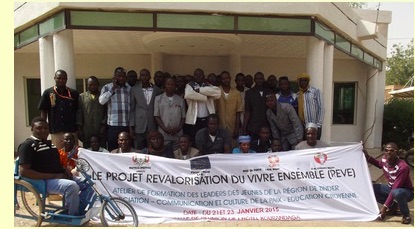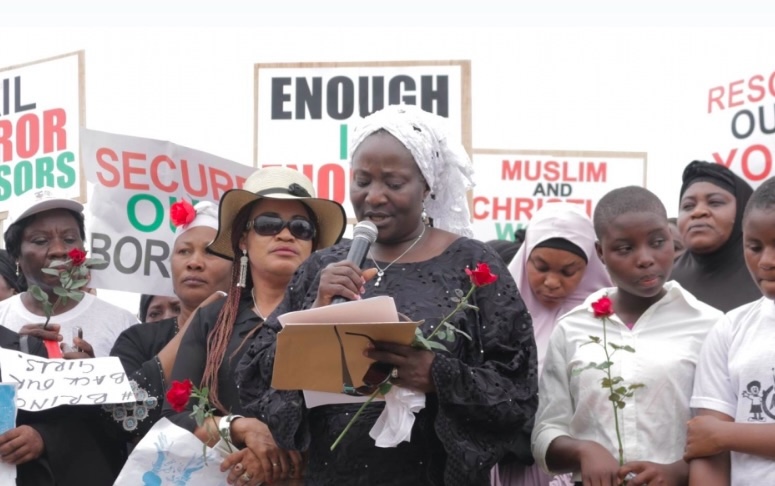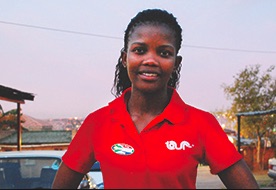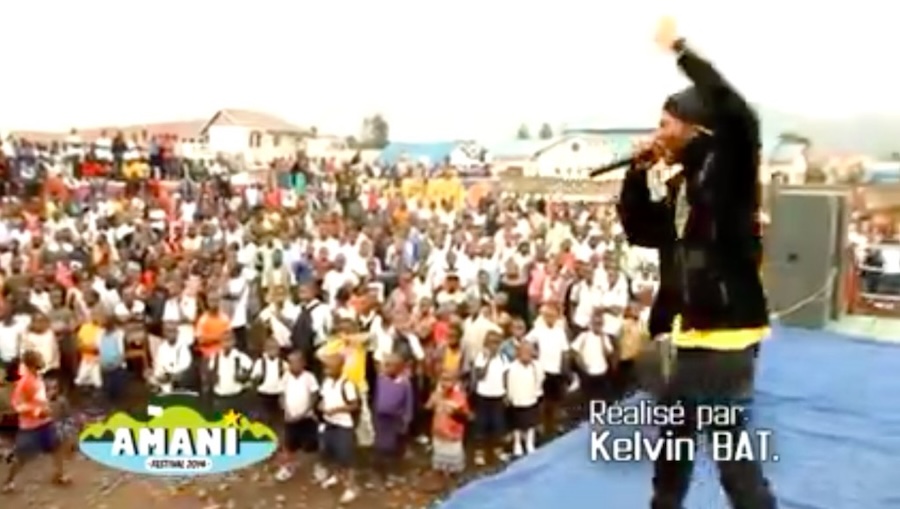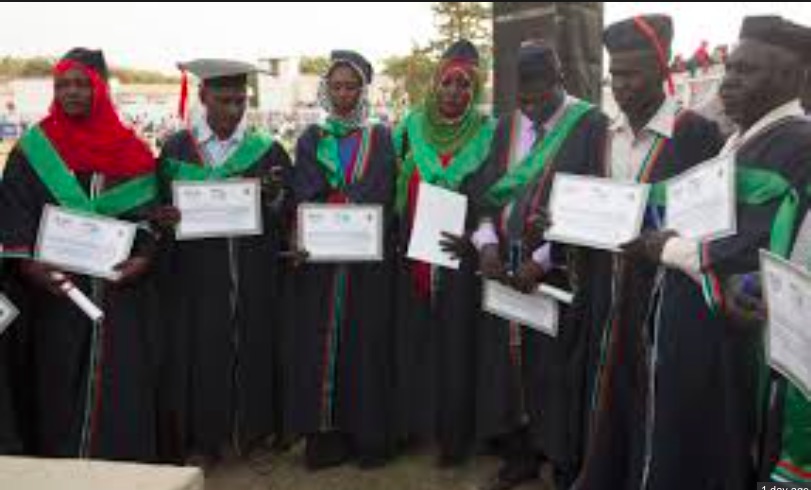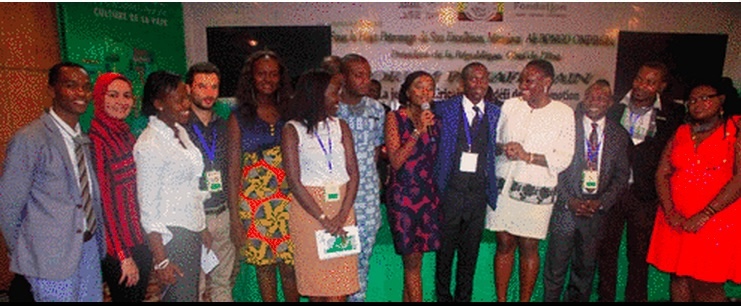. SUSTAINABLE DEVELOPMENT .
an article by Peace Parks Foundation 2013 Annual Report
[Editor’s Note. A lucid description of the contribution of transfrontier peace parks to peace among the countries of Southern Africa was presented by Paul Bewsher, to the recent IIPT meeting on Peace through Tourism. Although we don’t have a copy of his talk, here is similar information from the Peace Parks Foundation Annual Report]
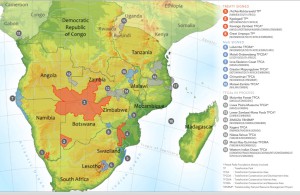
Location of the 18 transfrontier peace parks in Southern Africa.
click on photo to enlarge
By 1988 the idea had taken root within the World Conservation Union. Initially they identified 70 potential transfrontier conservation areas (TFCAs) in 65 countries around the world, but today the figure stands at 227 transboundary protected area complexes incorporating 3 043 individual protected areas or internationally designated sites.
It was in Africa, however, that the peace parks concept truly sparked into life. The brave dream of contiguous TFCAs in southern Africa began its realisation in the mid-1990s in the discussions of visionary leaders as they contemplated a new era of regional peace, democracy and development.
In the years since, it has been the political will of leaders in southern Africa, and the efforts of an organisation set up to champion the peace parks concept, that has seen the vision of peace parks taking shape on the subcontinent. Spearheaded by Dr Anton Rupert, and with President Nelson Mandela and HRH Prince Bernhard of the Netherlands as co-founding patrons, Peace Parks Foundation was founded on 1 February 1997 to facilitate the creation of TFCAs throughout southern Africa.
The concept of the region’s peace parks is as glorious as it is audacious: vast conservation areas that straddle national borders, of sufficient extent to incorporate entire biomes; of sufficient integrity to restore the ancient patterns of diverse ecological communities, and of sufficient vision to reconnect the shared cultures of tribal peoples, dislocated when colonial rulers arbitrarily imposed Africa’s borders.
Southern Africa’s peace parks today incorporate over half of the declared conservation estate in the region. At over a million square kilometres, they rival the combined landmass of France and Spain. These parks are as astounding in their extent as in their natural magnificence, the immense richness of their biodiversity and the importance of their cultural heritage.
[Although the emphasis is largely on natural preservation, there are also examples of transborder cultural initiatives include the following}
The !Ae!Hai Kalahari Heritage Park is managed by a joint management board, which comprises representatives from the ‡Khomani San and Mier communities and SANParks. The heritage park aims to preserve the cultural and traditional knowledge of these indigenous communities, while improving their opportunities to earn a livelihood. One of the key objectives is to expose the Bushman children to the traditional lifestyles of their ancestors. This is realised through the implementation of the traditional veld school at Bobbejaanskop, while adults participate in a similar programme at Imbewu Camp.
Question related to this article:
How can tourism promote a culture of peace?
Comment by Liliana Mota, October 23, 2013
Why tourism?
Can tourism be seen as an instrument to achieve complicity between people’s minds?
“There is nothing better that connects two people’s mind than a good conversation” The above quote could be used to describe the effect which tourism has on people. Like a great conversation, tourism could be said to play a vital role amongst people all over the world. It fosters communication in all its senses, intercultural dialogue and mutual understanding.
In today’s world it is evident that there is a shortage of moral or ethical values amongst people across the different nations in this world, resulting in a globalised world lacking these morals and ethical values. Ignorance, the failure to consider the needs of others, and selfishness are a few of the ways which hinder us from embracing diversity and a common human perspective, which would result informal empathy, internal moral compassion, tolerance of differences, historical consciousness and interpretation. The above mentioned features are intrinsic, inherent and can be found in the practice of tourism.
Tourism has been emphasized as one of the most effective instruments which continue to tackle to tackle social and economical poverty, as well as encourage the culture of peace practice amongst people. In looking at the UN architecture, one is able to see the growing implications which the tourism sector has on the world and world policies. The touristic phenomenon has achieved a world record of 5% of world’s GDP contribution and is responsible for 235 millions jobs, according to the UNWTO’s data. Often the tourism sector counts more than 20% of the countries’ GDP.
On the negative side of this, it is evident that tourism focuses on economical matters, depriving any focus on the global implications of the constant interaction tourism encourages.
In the literal sense, tourism is nothing more or less than people meeting with the willingness to understand each other’s differences and point of view and simultaneously creating the opportunity for dialogue, mutual understanding and peace to take place.
Apart from tourism, various factors could be seen to play a role in encouraging integration and diversity amongst societies across the world. For example, the cultural segment has played an essential source of people’s integration and inclusiveness in developing countries.
Education has also played a significant role in encouraging integration, and incorporation amongst people all over the world. Education has been reconsidered and proposed to being the catalyst for exchange between countries, cultures and sectors, and most importantly for enhancing the lives of people by granting them the opportunity to leave their poverty stricken lives and societies in exchange a for better future which includes job and exchange opportunities.
In the tourism world, differences play the most essential role, differences among people represents the added-value. Being different is always a positive factor that usually motivates and encourages people to get to move and engage with each other and embrace the differences with the use of spiritual, religious and cultural meanings.
This notion of tourism needs to be addressed in multilateral governance discussions, where all the main actors, the international community, the ministerial and experts, private sector, local institutions and civil society engages are all present, and are all willing to work together in combined efforts and initiatives (from poverty alleviation to the promotion of awareness of sustainable development addressing special needs like regional development, urban planning and protection of natural and cultural landscapes). This combined approach of working at the local level within communities and at the national and international level, in order to reach and engage the poor, has been considered as potentially being the “one possible and effective answer” and effective approach towards the world’s poorest areas where it can make a difference.
